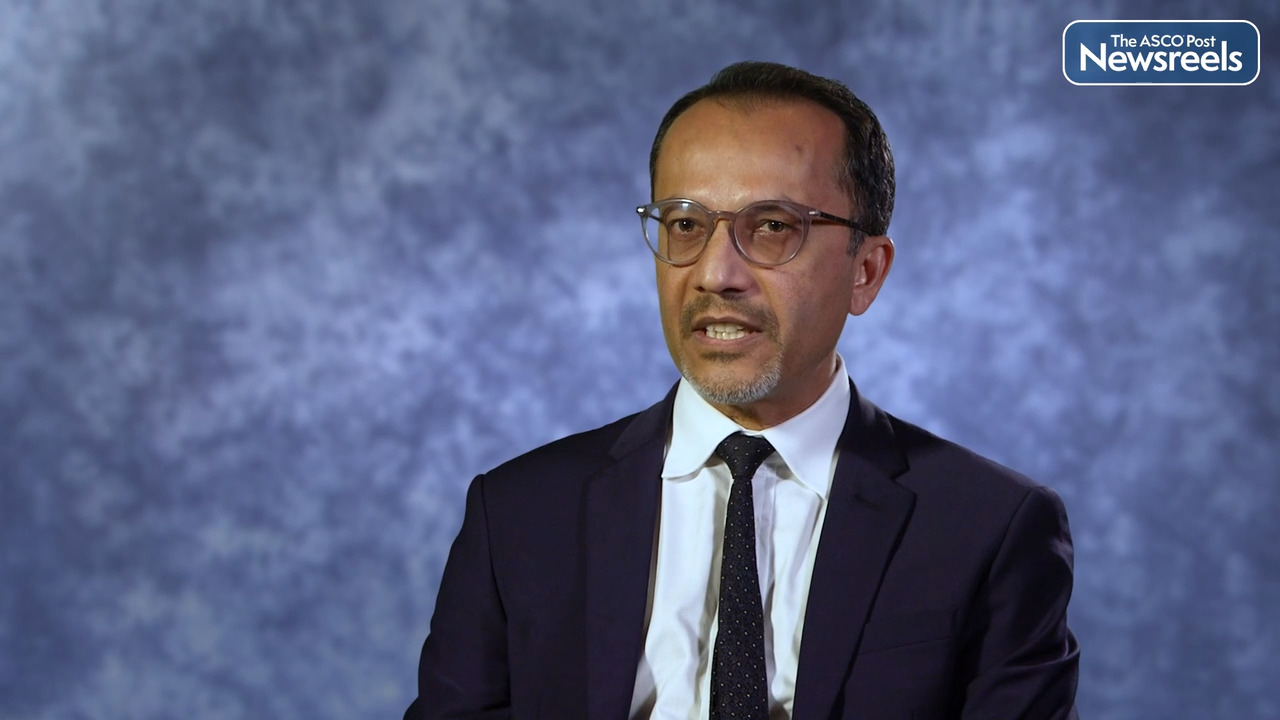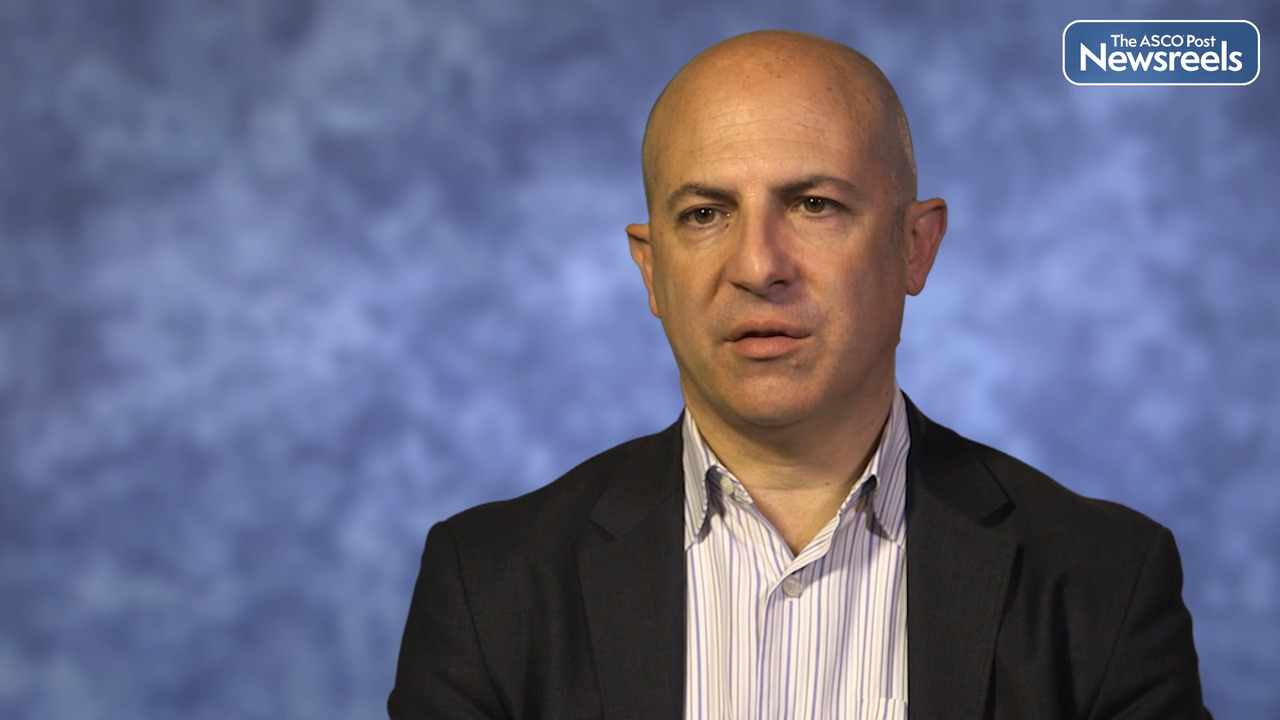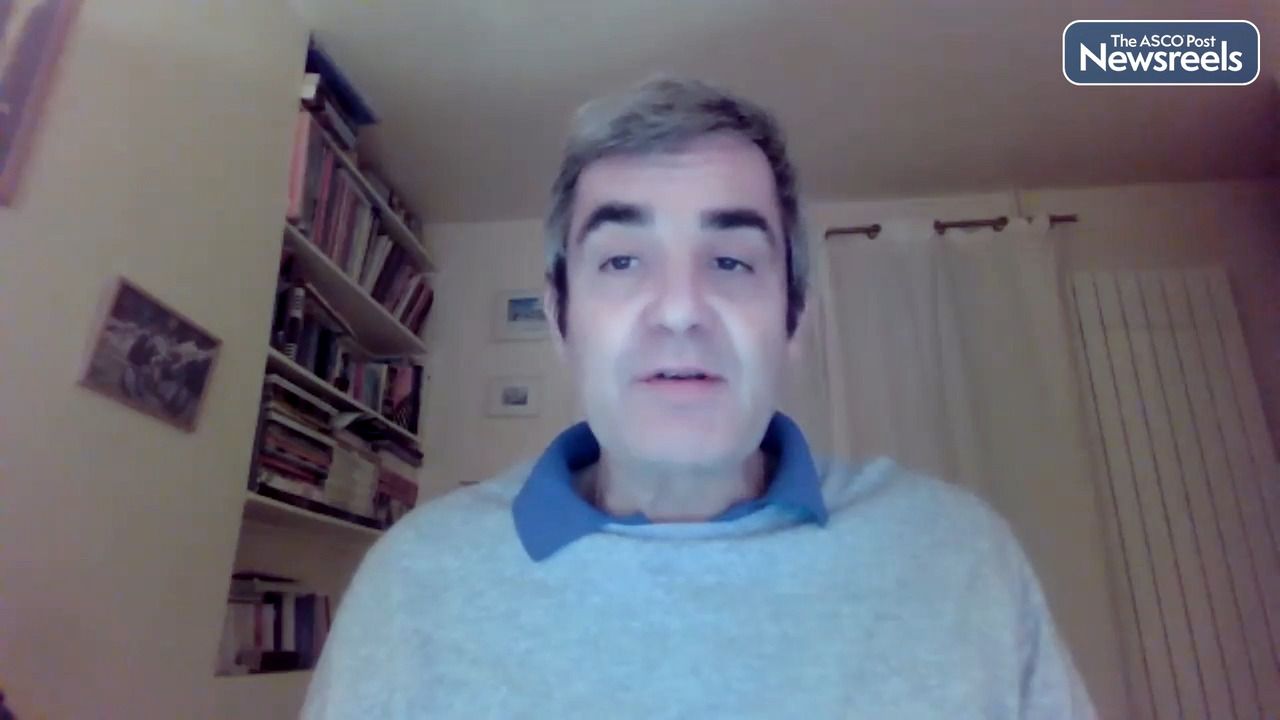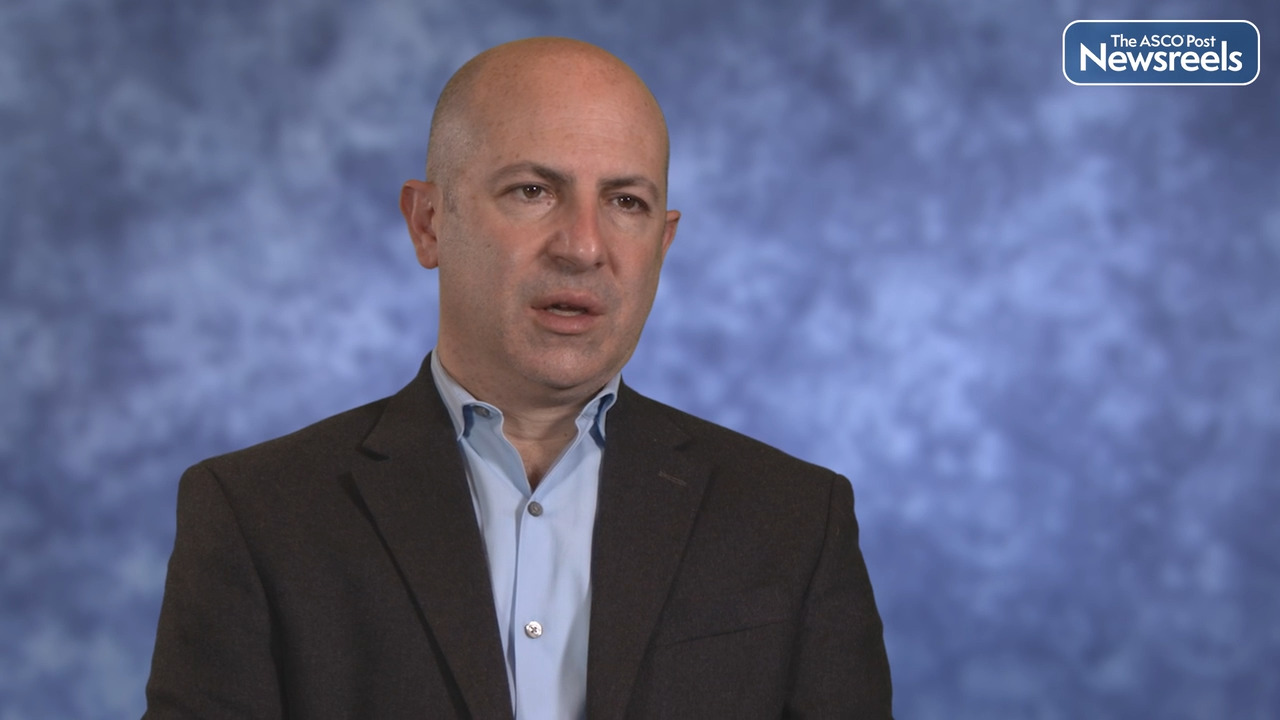Gulam A. Manji, MD, PhD, on Gastric and Gastroesophageal Junction Adenocarcinomas: New Data on Pembrolizumab Plus Capecitabine and Oxaliplatin
Gulam A. Manji, MD, PhD, of Columbia University Medical Center, discusses phase II results on perioperative combination chemotherapy and pembrolizumab in patients with resectable gastric cancer. The combination appeared to result in many complete pathologic responses (Abstract CT009).
Assessment of Cancer Risk Profile for Germline BRCA1 and BRCA2 Pathogenic Variants in Patients With Common Cancers
In a Japanese case-control study reported in JAMA Oncology, Momozawa et al found that germline BRCA1/2 pathogenic variants were associated with an increased risk of biliary tract, esophageal, and gastric cancers, in addition to an increased risk of cancers that have well-established associations...
Zev Wainberg, MD, on Gastroesophageal Junction Adenocarcinoma: Early Results With Anti-CD39 Antibody Plus Chemoimmunotherapy
Zev Wainberg, MD, of the University of California, Los Angeles Medical Center, discusses preliminary data on the safety and efficacy of TTX-030, an anti-CD39 antibody, in combination with budigalimab and FOLFOX for the first-line treatment of locally advanced or metastatic gastric or gastroesophageal junction adenocarcinoma. The study suggests the regimen may prove to be of benefit as a first-line treatment, regardless of combined positive score status (Abstract CT015).
EGFR Inhibition in EGFR-Amplified Advanced Gastroesophageal Cancer
As reported in the Journal of Clinical Oncology by Maron et al, a retrospective study found that use of EGFR inhibitor therapy was associated with benefit in patients with unresectable or metastatic EGFR-amplified gastroesophageal adenocarcinoma. As stated by the investigators, “Subset analyses...
Adjuvant Nivolumab Improves Disease-Free Survival vs Placebo in Resected Esophageal or Gastroesophageal Junction Cancer After Neoadjuvant Chemoradiotherapy
As reported in The New England Journal of Medicine by Ronan J. Kelly, MB BCh, MBA, of The Charles A. Sammons Cancer Center at Baylor University Medical Center, and colleagues, an interim analysis of the phase III CheckMate 577 trial has shown a significant improvement in disease-free survival with ...
KEYNOTE-811: Pembrolizumab Plus Trastuzumab and Chemotherapy in Previously Untreated Advanced HER2-Positive Gastric Adenocarcinoma
As reported in Nature by Yelena Y. Janjigian, MD, of the Gastrointestinal Oncology Service at Memorial Sloan Kettering Cancer Center, and colleagues, the first interim analysis of the phase III KEYNOTE-811 trial has shown a significantly higher objective response rate with the addition of...
Recent FDA Approvals in Gastrointestinal Cancer
Over the past year, the U.S. Food and Drug Administration granted approval to several novel drugs and new indications for older therapeutic agents used in gastrointestinal oncology. Cetuximab Plus Encorafenib On September 28, 2021, cetuximab (Erbitux) was approved in combination with encorafenib...
Expert Point of View: Samuel J. Klempner, MD
Samuel J. Klempner, MD, Associate Professor at Massachusetts General Hospital and Harvard Medical School, commented on the NEONIPIGA study for The ASCO Post. “This study was the first prospective data set to show what many have suspected—that neoadjuvant immune checkpoint blockade would lead to a...
Neoadjuvant Checkpoint Inhibitor Doublet Yields Complete Responses in Gastroesophageal Cancers
In patients with resectable microsatellite instability–high (MSI-H)/mismatch repair–deficient (dMMR) gastric and gastroesophageal junction adenocarcinoma, dual checkpoint inhibition with ipilimumab and nivolumab given as neoadjuvant therapy led to a pathologic complete response rate of 58.6%,...
Adding Pembrolizumab to Chemotherapy Improves Overall and Progression-Free Survival in First-Line Treatment of Advanced Esophageal Cancer
As reported in The Lancet by Jong-Mu Sun, MD, of Samsung Medical Center, Sungkyunkwan University, Seoul, and colleagues, an interim analysis in the phase III KEYNOTE-590 trial has shown that the addition of first-line pembrolizumab to chemotherapy resulted in improved overall and progression-free...
Adding First-Line Nivolumab to Chemotherapy Improves Survival in Gastric, Gastroesophageal Junction, and Esophageal Adenocarcinomas
As reported in The Lancet by Yelena Y. Janjigian, MD, of the Gastrointestinal Oncology Service, Memorial Sloan Kettering Cancer Center, and colleagues, the phase III CheckMate 649 trial has shown that the addition of first-line nivolumab to chemotherapy resulted in improved overall and...
Expert Point of View: Stefano Cascinu, MD
Stefano Cascinu, MD, of the Comprehensive Cancer Center, Università Vita-Salute, IRCCS-Ospedale San Raffaele, Milan, Italy, was the invited discussant of KEYNOTE-5901 and CheckMate 649.2 “These landmark studies could change the treatment paradigm of advanced esophageal and gastric cancers. They...
Checkpoint Inhibitors in Esophagogastric Cancer: Updates of Landmark Trials
Updates of landmark trials of immune checkpoint inhibitors as first-line therapy for advanced HER2-negative esophagogastric cancers were presented at the 2022 ASCO Gastrointestinal Cancers Symposium. The studies upheld previous findings of an overall survival benefit when these agents are paired...
Expert Point of View: Samuel J. Klempner, MD
Samuel J. Klempner, MD, Associate Professor at Massachusetts General Hospital and Harvard Medical School, commented on the NEONIPIGA study for The ASCO Post. “This study was the first prospective data set to show what many have suspected—that neoadjuvant immune checkpoint blockade would lead to a...
Neoadjuvant Checkpoint Inhibitor Doublet Yields Complete Responses in Gastroesophageal Cancers
In patients with resectable microsatellite instability–high (MSI-H)/mismatch repair–deficient (dMMR) gastric and gastroesophageal junction adenocarcinoma, dual checkpoint inhibition with ipilimumab and nivolumab given as neoadjuvant therapy led to a pathologic complete response rate of 58.6%,...
Updated Findings on T-DXd in Gastrointestinal Malignancies
Updates of phase II studies evaluating fam-trastuzumab deruxtecan-nxki (T-DXd) in gastrointestinal cancers were presented at the 2022 ASCO Gastrointestinal Cancers Symposium, continuing to offer support for the antibody-drug conjugate in these malignancies. In HER2-expressing gastric cancer, T-DXd...
Pretreatment Cardiovascular Disease and Events in Patients Receiving Curative-Intent Chemoradiation for Esophageal Cancer
In a Danish single-institution study reported in JACC: CardioOncology, Mette Marie A. Søndergaard, MD, of the Department of Cardiology, Aarhus University Hospital, Denmark, and colleagues found a high rate of undetected or inadequately treated preexisting cardiovascular disease (CVD) prior to...
CheckMate 648: Nivolumab Plus Chemotherapy or Ipilimumab vs Chemotherapy in Previously Untreated Advanced Esophageal Squamous Cell Carcinoma
As reported in The New England Journal of Medicine by Doki et al, the phase III CheckMate 648 trial has shown improved overall survival with nivolumab combined with chemotherapy or ipilimumab vs chemotherapy alone in patients with previously untreated advanced esophageal squamous cell carcinoma, in ...
Thierry André, MD, on Esophagogastric Adenocarcinoma: New Findings on Nivolumab and Ipilimumab
Thierry André, MD, of Sorbonne University and Saint-Antoine Hospital, discusses phase II results from the GERCOR NEONIPIGA study, which suggests neoadjuvant therapy with nivolumab and ipilimumab may be associated with a high pathologic complete response rate in patients with localized microsatellite instability–high or mismatch repair–deficient esophagogastric adenocarcinoma. This study raises the question of whether surgery could be delayed or avoided for some patients (Abstract 244).
Zev A. Wainberg, MD, on Gastric or Gastroesophageal Junction Adenocarcinoma: Follow-up Data on Pembrolizumab and Chemotherapy
Zev A. Wainberg, MD, of the University of California, Los Angeles, discusses an update, of 25 additional months, on phase III safety and efficacy results from the KEYNOTE-062 trial. This study compared pembrolizumab with or without chemotherapy vs chemotherapy alone for patients with PD-L1–positive advanced gastric or gastroesophageal junction adenocarcinoma (Abstract 243).
Addition of Perioperative Trastuzumab to Neoadjuvant Chemoradiation for Patients With HER2-Overexpressing Esophageal Adenocarcinoma
As reported in The Lancet Oncology by Howard P. Safran, MD, and colleagues, the phase III NRG Oncology/RTOG-101 trial has shown no significant disease-free survival benefit with the addition of perioperative trastuzumab to neoadjuvant chemoradiation in previously untreated patients with...
Pembrolizumab Plus Chemotherapy in Advanced Esophageal Cancer: Good News for Some, but More Work to Be Done
Multiple comparisons of traditional cytotoxic chemotherapy combinations that began decades ago led to the adoption of the platinum plus fluorouracil doublet as the standard of care for treatment of recurrent or metastatic esophageal cancer.1 Other combinations created by the addition and/or...
Kohei Shitara, MD, on Gastric and Esophageal Cancers: Long-Term Follow-up on Nivolumab Plus Chemotherapy
Kohei Shitara, MD, of Japan’s National Cancer Center Hospital East, discusses a long-term data follow-up from CheckMate 649, which support the continued use of nivolumab plus chemotherapy as first-line treatment in patients with advanced gastric, gastroesophageal junction, and esophageal adenocarcinomas (Abstract 240).
Pretreatment Cardiovascular Disease and Events During Follow-up in Patients Receiving Curative-Intent Chemoradiation for Esophageal Cancer
In a Danish single-institution study reported in JACC: CardioOncology, Søndergaard et al found a high rate of undetected or inadequately treated preexisting cardiovascular disease prior to the receipt of chemoradiation and a high rate of cardiovascular events during follow-up in patients undergoing ...
Long-Term Swallowing Quality-of-Life Results With Radiotherapy vs Transoral Robotic Surgery for Oropharyngeal Cancer
In a long-term longitudinal analysis of the phase II ORATOR trial reported in the Journal of Clinical Oncology, Anthony Nichols, MD, and colleagues found that a statistically significant improvement in swallowing quality of life persisted through 3 years after treatment with radiotherapy vs...
Selecting Patients With Barrett's Esophagus for Endoscopic Surveillance: Role of Nonendoscopic Device Biomarkers
In a study reported in The Lancet Oncology, Pilonis et al found that nonendoscopic cell collection device (marked as the Cytosponge)–detected atypia and p53 overexpression could be used in combination with clinical risk factors to triage patients with Barrett’s esophagus for endoscopic...
Addition of Nivolumab to Oxaliplatin-Based Chemotherapy for HER2-Negative, Unresectable, Advanced or Recurrent Gastric or Gastroesophageal Junction Cancer
In an Asian phase II/III trial (ATTRACTION-4) reported in The Lancet Oncology, Yoon-Koo Kang, MD, and colleagues found that the addition of nivolumab to oxaliplatin-based chemotherapy improved progression-free survival—but not overall survival—as first-line treatment of HER2-negative, unresectable, ...
New Research Aims to Uncover Cellular Source of Barrett’s Esophagus
Two recent studies correct a long-standing misconception about the origins of Barrett’s esophagus and, in doing so, may point to new avenues of treatment or prevention to lower the risk of esophageal cancer. The first study, published by Singh et al in the journal Gastroenterology, demonstrated...
Study Suggests Lack of Benefit With the Addition of Immune Checkpoint Inhibition to Chemotherapy in Low PD-L1–Expressing Gastric or Esophageal Adenocarcinoma
In an analysis reported in the Journal of Clinical Oncology, Zhao et al found that the addition of an immune checkpoint inhibitor to chemotherapy in trials of first-line treatment of advanced gastric or esophageal adenocarcinoma was not associated with benefit in low PD-L1–expressing subgroups not...
Health-Related Quality of Life With Pembrolizumab vs Chemotherapy for Advanced Esophageal Cancer
In a study reported in the Journal of Clinical Oncology, Adenis et al found that health-related quality of life was maintained with both pembrolizumab and chemotherapy in the pivotal phase III KEYNOTE-181 trial, which included patients with advanced esophageal cancer who had received previous...
FDA Pipeline: Recent Reviews, Designations, Applications, and Authorizations in the Oncology Space
Over the past month, the U.S. Food and Drug Administration (FDA) issued several regulatory decisions for novel treatments for patients with cancer. Priority Review for Relatlimab and Nivolumab Fixed-Dose Combination in Unresectable or Metastatic Melanoma The FDA accepted for Priority Review the...
Nivolumab Plus Chemotherapy Improves Survival in Advanced Gastric and Esophageal Adenocarcinomas: Now to Figure Out the Details in These Heterogeneous Diseases
There is no doubt that subsets of patients with esophageal and gastric cancers benefit from immune checkpoint inhibitor therapy. The complexity lies in identifying the appropriate histology, tumor location, expression of programmed cell death receptors and ligands, mechanism of checkpoint...
Adding First-Line Nivolumab to Chemotherapy Improves Survival in Gastric, Gastroesophageal Junction, and Esophageal Adenocarcinomas
As reported in The Lancet by Yelena Y. Janjigian, MD, of the Gastrointestinal Oncology Service, Memorial Sloan Kettering Cancer Center, and colleagues, the phase III CheckMate 649 trial has shown that the addition of first-line nivolumab to chemotherapy resulted in improved overall and...
DESTINY-Gastric02: Fam-Trastuzumab Deruxtecan-nxki Produces Responses in Patients With HER2-Positive Gastric Cancers
In the primary analysis of the phase II DESTINY-Gastric02 trial, fam-trastuzumab deruxtecan-nxki (T-DXd) produced clinically meaningful and durable responses in Western patients with advanced HER2-positive gastric or gastroesophageal junction cancers whose disease had progressed after a...
Reduced-Intensity Chemotherapy for Older, Frail Patients With Advanced Gastroesophageal Cancer
Patients who had advanced gastroesophageal cancer but were considered unsuitable for full-dose chemotherapy because of their advanced age and/or frailty “had an improved patient experience with no significant detriment in cancer control” when treated with reduced-intensity chemotherapy in the phase ...
Pembrolizumab Combined With Trastuzumab and Chemotherapy for HER2-Positive Gastric or Gastroesophageal Junction Adenocarcinoma
On May 5, 2021, pembrolizumab was granted accelerated approval for use in combination with trastuzumab and fluoropyrimidine- and platinum-containing chemotherapy for the first-line treatment of patients with locally advanced unresectable or metastatic HER2-positive gastric or gastroesophageal...
Addition of Pembrolizumab to Chemotherapy for the First-Line Treatment of Advanced Esophageal Cancer: KEYNOTE-590
As reported in The Lancet by Sun et al, the phase III KEYNOTE-590 trial showed that the addition of first-line pembrolizumab to chemotherapy resulted in improved overall and progression-free survival in patients with advanced esophageal and Siewert type 1 gastroesophageal junction (GEJ) cancers....
Expert Point of View: Kei Muro, MD, PhD
The RATIONALE 302 trial1 was discussed by Kei Muro, MD, PhD, of Aichi Cancer Center Hospital in Nagoya, Japan, who found the results promising. However, Dr. Muro questioned the role of PD-1/L1 inhibitors as second-line therapy for advanced esophageal squamous cell carcinoma. RATIONALE 302 is the...
RATIONALE 302: Tislelizumab Improves Overall Survival as Second-Line Treatment of Esophageal Cancer
In the phase III RATIONALE 302 trial, the novel anti–PD-1 antibody tislelizumab, being developed in China, improved overall survival vs chemotherapy as second-line therapy for esophageal squamous cell carcinoma, according to Jaffer Ajani, MD, of The University of Houston MD Anderson Cancer Center,...
S-1 Chemoradiation vs Radiotherapy Alone in Patients Aged 70 to 85 With Esophageal Cancer
In a Chinese phase III trial reported in JAMA Oncology, Ji et al found that concurrent chemoradiation with S-1 was associated with improved overall survival and acceptable toxicity vs radiotherapy alone in older patients with esophageal cancer. As stated by the investigators, “Most older patients ...
Perioperative or Postoperative Oxaliplatin/S-1 vs Postoperative Oxaliplatin/Capecitabine for Locally Advanced Gastric Cancer
In the Chinese phase III RESOLVE trial reported in The Lancet Oncology, Zhang et al found that perioperative S-1/oxaliplatin was superior to—and adjuvant S-1/oxaliplatin was noninferior to—adjuvant capecitabine/oxaliplatin in terms of disease-free survival in patients undergoing D2 gastrectomy for...
Pembrolizumab Combined With Chemotherapy for Advanced Esophageal or Gastroesophageal Junction Carcinoma
On March 22, 2021, pembrolizumab was approved for use in combination with platinum- and fluoropyrimidine-based chemotherapy for patients with metastatic or locally advanced esophageal or gastroesophageal junction (tumors with epicenter 1 to 5 cm above the gastroesophageal junction) carcinoma who...
International Esodata Study Group Model for Predicting 90-Day Mortality After Esophagectomy
In a retrospective analysis reported by researchers from the International Esodata Study Group (IESG) in JAMA Surgery, D’Journo et al developed a model for predicting risk of 90-day mortality following esophagectomy for patients with esophageal or gastroesophageal junction cancer. As stated by the...
Effect of Radiotherapy Dose Escalation in Definitive Chemoradiation for Locally Advanced Esophageal Cancer
In a Dutch phase III trial (ARTDECO) reported in the Journal of Clinical Oncology, Hulshof et al found that increasing the dose of radiation therapy in a definitive chemoradiation regimen did not improve local progression-free survival in patients with inoperable, locally advanced esophageal...
Addition of First-Line Nivolumab to Chemotherapy in Advanced Gastric Cancers: CheckMate 649
As reported in The Lancet by Yelena Y. Janjigian, MD, and colleagues, the phase III CheckMate 649 trial has shown that the addition of first-line nivolumab to chemotherapy resulted in improved overall and progression-free survival among patients with advanced HER2-negative gastric, gastroesophageal ...
PET Response–Adapted Chemoradiotherapy for Esophageal and Esophagogastric Junction Adenocarcinoma
As reported in the Journal of Clinical Oncology by Karyn A. Goodman, MD, and colleagues, mature results of the phase II CALGB 80803/Alliance trial indicated that treatment guided by early positron-emission tomography (PET) assessment of response to induction neoadjuvant chemotherapy improved...
Disease-Free Survival Benefit With Adjuvant Immunotherapy in Resectable Esophageal Cancer: Practice-Changing for All Patients?
The CheckMate 577 trial—reported in The New England Journal of Medicine by Kelly et al1 and reviewed in this issue of The ASCO Post—is the first global randomized controlled trial for patients with resectable esophageal cancer that showed a significant disease-free survival benefit for adjuvant...
Adjuvant Nivolumab Improves Disease-Free Survival vs Placebo in Resected Esophageal or Gastroesophageal Junction Cancer After Neoadjuvant Chemoradiotherapy
As reported in The New England Journal of Medicine by Ronan J. Kelly, MB BCh, MBA, of The Charles A. -Sammons Cancer Center at Baylor University Medical Center, and colleagues, an interim analysis of the phase III CheckMate 577 trial has shown a significant improvement in disease-free survival...
Nivolumab Plus Chemotherapy and Nivolumab Plus Ipilimumab as First-Line Treatment for Patients With Advanced Esophageal Cancer
The first results from the phase III CheckMate 648 study represent significant progress in the treatment of patients with advanced esophageal squamous cell carcinoma. The trial evaluated first-line treatment with nivolumab plus chemotherapy or nivolumab plus ipilimumab in patients with advanced...
Ian Chau, MD, on Esophageal Squamous Cell Carcinoma: Nivolumab, Ipilimumab, and Chemotherapy for Advanced Disease
Ian Chau, MD, of Royal Marsden NHS Foundation Trust, discusses first results of the CheckMate 648 study, which showed that nivolumab plus chemotherapy and nivolumab plus ipilimumab both demonstrated superior overall survival vs chemotherapy alone in patients with advanced esophageal squamous cell carcinoma. These regimens may represent potential new first-line treatment options (Abstract 4001).






